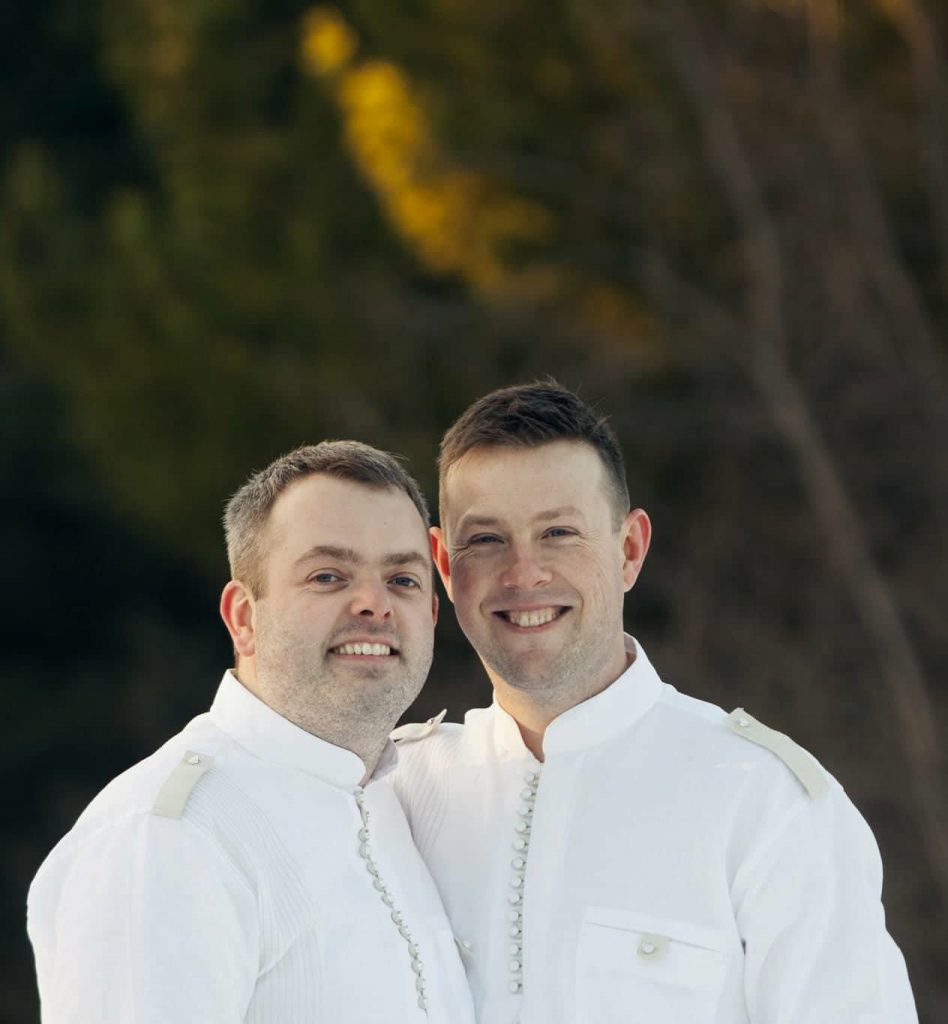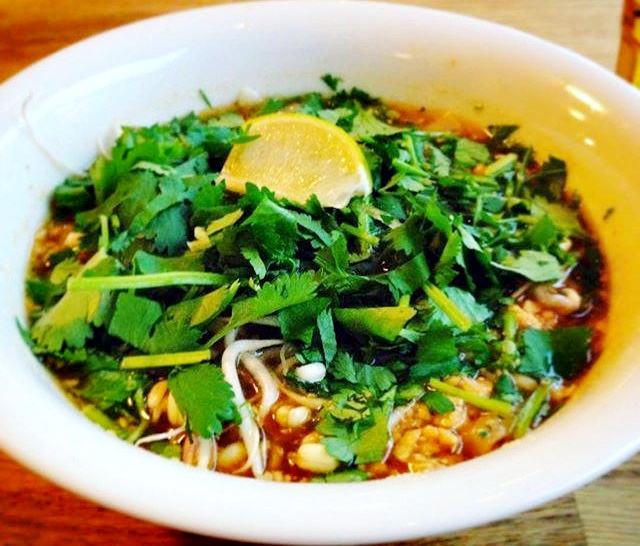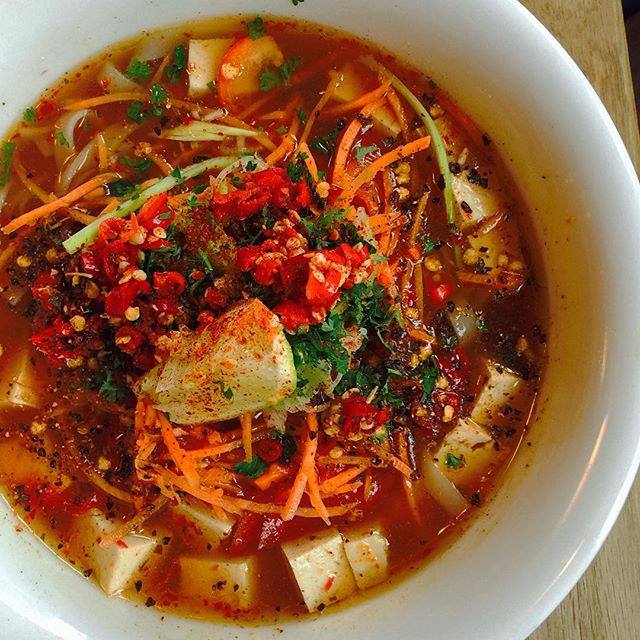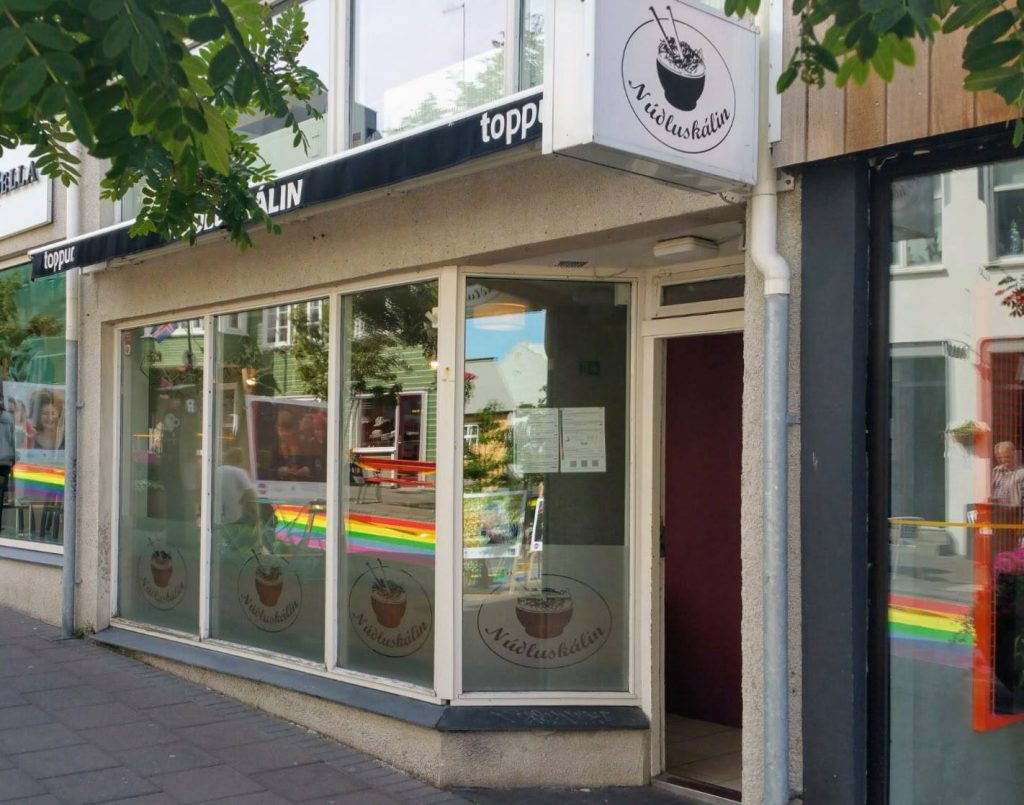The gay owned and operated noodle bar Núðluskálin located at street Skólavörðustígur 8 has for years been one of Reykjavík’s most popular restaurants. GayIceland asked owner Sigurður Jónas Eysteinsson to tell us about the food and menu which, as it turns out, is infused by his own unusual story.

What attracts people to Núðluskálin is of course the flavorful perfectly cooked noodles. The owner and manager Sigurður Jónas Eysteinsson, called Siggi, with his passion and unique imagination offers regularly new recipes that always delight and impress his customers. Although, all the ingredients are listed on the menu, there is one thing missing. A secret ingredient, and it’s not what you think. It’s not a spice, or any kind of food, or a cooking method. It’s Siggi’s story. His biography presented in a bowl of noodles.
“Before sending me off to the temple the family threw a big street party with a band playing and plenty to eat and drink. About three hundred people joined in celebrating me becoming a novice monk.”
At the age of seventeen, inspired by a newfound interest in Buddhism Siggi went to Thailand as an exchange student for a year. “It was the only buddhist country they offered,” he explains.
That was about all that he knew about Thailand, and that it was a third world country. Since not many students from Iceland had gone to Thailand before and this was in the pre-Google era he had put his imagination to work.
“It was obvious when I landed at a fancy international airport in Bangkok that I had misconceptions about what a third world country looked liked,” he says laughing. “I had prepared myself for a different life than actually awaited me. Being picked up by my hosting family in a brand new Toyota Highlander and placed in a private school with a pool and tennis courts, is something I did definitely not foresee.”
It took two and half hours to drive from the airport to the village where the family lived in a big and beautiful house on the riverbank. Although the next door neighbours lived in a small bamboo hut. Making the huge disparity in living standards unmistakable.

It didn’t take Siggi long to be seduced by the exotic flavours of Thai food and he became a regular at a few restaurants. “I couldn’t leave Thailand without learning how to make this food myself, so I asked at my favorite restaurants if they would teach me. They allowed me to practise making the food and I made sure to write down all the recipes so I could continue cooking in Iceland.”
Nevertheless, this awoken passion did not direct him away from the reason he went to Thailand.
“I wanted to become a Buddhist monk.” A very unusual goal for an Icelandic teen but not in Thailand where most men become novice monks at a young age. “Before sending me off to the temple the family threw a big street party with a band playing and plenty to eat and drink. About three hundred people joined in celebrating me becoming a novice monk.”
Siggi planned to stay at the temple for two weeks, but extended it to four weeks. He says that the monastic life was very simple and structured. He would wake up at 5 AM, have a quick wash. Put on his orange robes and walk the alms round barefoot in a row of monks.
“They only had two meals per day before noon. Rationed from the collected alms. Then the rest of the day was left for meditation and reflection.”
He thinks everyone should try this once in their life for at least a month. “It takes a couple of weeks for the structured simplicity of the monastic life break down your neurotic habits of all the mind. Automatic thoughts of all the things you need or have to do. Bringing you back to face yourself and allowing you to reflect on what it is you actually need and want.”

The skyscraper office
Siggi returned to Iceland to finish school, but was held back due to a prolonged teachers strike. When his boyfriend at the time, a talented pianist, was offered a position in Hong Kong, Siggi decided to tag along and learn some Chinese. At first he found work as an assistant chef at a portuguese restaurant, but then an interesting opportunity fell into his hands.

“One day I hear of an investment firm looking to train westerners in currency trading. Of course I jumped at the chance. Their offices were on the 30th floor of a glass skyscraper and there I sat in an overcrowded space behind a computer screen, screaming into the phone all day. While on a steep learning curve I was drained each day. Although compelling and exciting I felt it was not worth the exhaustion.”
Siggi says that in Hong Kong noodles were served in a more modern manner then he’d experienced in Thailand where they were only sold by street vendors. He thought he could do something similar in Iceland. He’d already left the chaotic and dazzling city of Hong Kong and gone back to Iceland. He’d broken up with the pianist and soon entered a new relationship. It didn’t take very long until he was boarding a plane to move to a new place. This time around, he flew west to California.
“I had the desperate housewife experience living in a sterile suburb in Irvine,” he says laughing. During his sun filled stay he picked up on something that would further enhance his idea for his own noodle bar. “That’s where I got to know Jamba juice and the the concept of eccentricity, were the food is customised to meet individual needs.” With a dash of eccentricity the idea hijacked his brain and kept him up at night. “I’d combine the traditional Thai noodles seasoned with chilli and lime, the take-away concept from Hong Kong and the Californian offered choice of added ingredients.”
When in crisis, noodle
For the longest time Siggi resisted the idea, thinking his wanderlust wouldn’t allow him to stay long in one spot. He stayed less than a year in California, moved back to Iceland, got married and divorced, worked as a graphic designer, finished a degree in psychology and ended up working for Capacent in Iceland. In the fall of 2008 the economy crashed and the prime minister asked God to bless Iceland. Siggi was out of a job and found himself at crossroads.

By that time he’d started a relationship with the man that’s his husband today, Kristján Jörgen Hannesson, and they’d often discussed starting their own business.
“That’s when we started thinking that opening a noodle bar might actually be a really good idea. Kristján loved the idea of starting our own company and was really determined to see it through.
So we pooled our resources and once a perfect location opened up we’d thought it be worth giving it a try. That would never have happened if we’d known about all the obstacles we had to face.
“Perhaps, I shouldn’t share this but sometimes I put new dishes on the menu that I’ve only tasted in my mind.”
Capitalism had been the dominant political rhetoric for years in Iceland , much based on the American dream. Therefore, we were surprised that no effort had been made to support start-ups and new businesses within the system. We had to run from one place to the other, and it seemed the right hand of the system had no idea what the left hand was doing.
We drained our funds quickly with costly mistakes due to complete lack of information on which licenses were required and how and when to apply. We were a week away from bankruptcy when we finally managed to open Núðluskálin.

Luckily, Núðluskálin was an instant hit and has been one of Reykjavik’s most popular restaurant for almost a decade. During that time, it’s gone through a few renovations and changes to the menu, although never straying from its original concept.
“Perhaps I can’t’ travel as much physically, but I fight stagnation by making some changes in my environment,” says Siggi and adds that if it hadn’t been for Kristján’s good business skills and staying power he might very well have sold the company later on in order to pursuit other ventures.
However, it’s clear to anyone that talks to Siggi that he has a unique mind and fascinating way of thinking. With a strong awareness of his own senses he can easily pull up detailed images in his mind and bring taste to his tongue as if the food was actually touching it. “Perhaps, I shouldn’t share this but sometimes I put new dishes on the menu that I’ve only tasted in my mind.”


